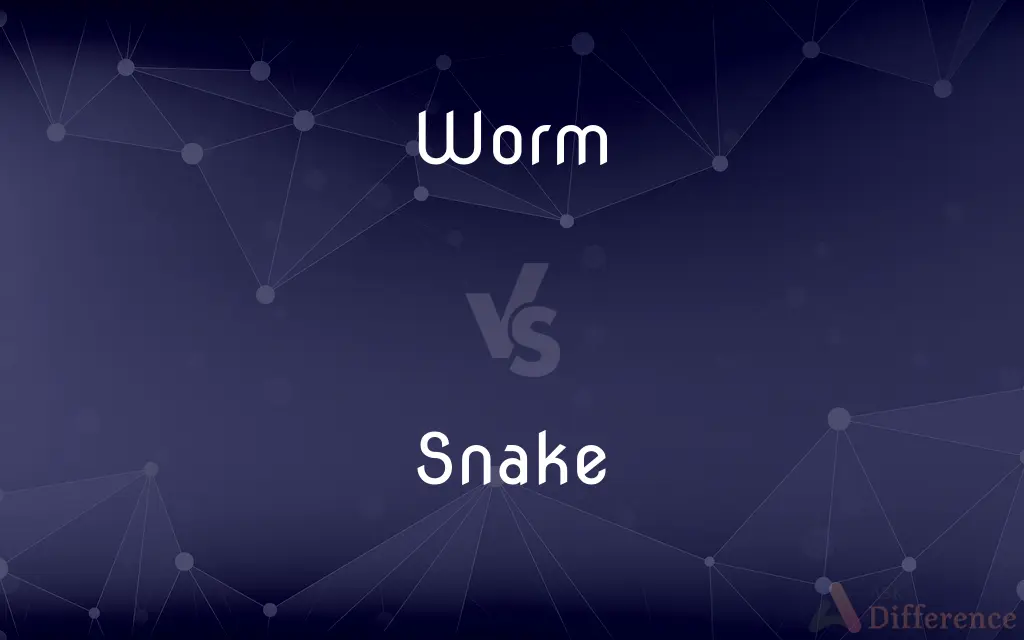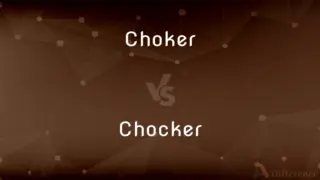Worm vs. Snake — What's the Difference?
By Urooj Arif & Maham Liaqat — Updated on March 13, 2024
Worms are invertebrates with a soft, elongated body, often segmented and found in various environments, while snakes are legless reptiles with scales, part of the Squamata order.

Difference Between Worm and Snake
Table of Contents
ADVERTISEMENT
Key Differences
Worms, encompassing a broad range of invertebrate animals, are typically characterized by their soft, elongated bodies that might be segmented, as in earthworms, or unsegmented, as in flatworms. They are found in diverse habitats, including soil, water, and even within other organisms as parasites. Snakes, on the other hand, are reptiles known for their legless form, elongated body, and scaled skin, adapted to a variety of habitats from forests to deserts.
The biological classification of worms is quite diverse, covering several phyla within the animal kingdom, including Annelida (segmented worms), Nematoda (roundworms), and Platyhelminthes (flatworms), among others. Snakes belong to the class Reptilia, specifically within the order Squamata, which also includes lizards and amphisbaenians.
Worms play crucial roles in ecosystems, such as soil aeration and nutrient recycling, particularly earthworms which are known for enhancing soil fertility. Snakes contribute to controlling pest populations, as many species prey on rodents and insects, thereby maintaining a balanced ecosystem.
Reproductive strategies also differ widely among worms and snakes. Many worms, including earthworms, can reproduce both sexually and asexually, with some species capable of regeneration from segments. Snakes predominantly reproduce sexually, with some species laying eggs (oviparous) and others giving birth to live young (viviparous or ovoviviparous).
The public perception and cultural significance of worms and snakes vary greatly, with worms often associated with decay or used as fishing bait, while snakes carry a wealth of symbolic meanings, from danger and deceit to healing and fertility, across different cultures.
ADVERTISEMENT
Comparison Chart
Kingdom
Animalia (Invertebrates)
Animalia (Vertebrates)
Habitat
Soil, water, inside hosts
Forests, deserts, water bodies
Role in Ecosystem
Soil aeration, nutrient cycling
Pest control, prey for other predators
Reproduction
Both sexual and asexual, some capable of regeneration
Primarily sexual, oviparous or viviparous
Perception
Often seen as benign, associated with soil health
Varied, ranging from fear to reverence
Compare with Definitions
Worm
An invertebrate with a soft, elongated body, often found in soil.
The garden is full of worms, indicating healthy soil.
Snake
A legless reptile with scales, belonging to the Squamata order.
Snakes are often misunderstood creatures of the wild.
Worm
Some species are used in vermiculture and vermicomposting.
Red wiggler worms are popular for organic composting.
Snake
Adaptable to various environments, from forests to deserts.
The rattlesnake thrives in desert regions.
Worm
Can be segmented or unsegmented, diverse in habitat.
Marine worms are fascinating creatures of the ocean.
Snake
Some species are venomous, used for defense and hunting.
The cobra uses its venom to immobilize prey.
Worm
Includes a variety of phyla, from earthworms to flatworms.
Tapeworms, a type of flatworm, can be parasites in animals.
Snake
Predatory, playing a key role in controlling pest populations.
Snakes help maintain the balance by preying on rodents.
Worm
Plays a vital role in decomposing organic matter.
Worms break down fallen leaves, enriching the soil.
Snake
Cultural symbolism varies widely, from wisdom to danger.
In many cultures, snakes symbolize rebirth due to their shedding skin.
Worm
Worms are many different distantly related animals that typically have a long cylindrical tube-like body, no limbs, and no eyes. Worms vary in size from microscopic to over 1 metre (3.3 ft) in length for marine polychaete worms (bristle worms), 6.7 metres (22 ft) for the African giant earthworm, Microchaetus rappi, and 58 metres (190 ft) for the marine nemertean worm (bootlace worm), Lineus longissimus.
Snake
Snakes are elongated, limbless, carnivorous reptiles of the suborder Serpentes . Like all other squamates, snakes are ectothermic, amniote vertebrates covered in overlapping scales.
Worm
Any of various invertebrates, especially an annelid, flatworm, nematode, or nemertean, having a long, flexible, rounded or flattened body, often without obvious appendages.
Snake
See Shoshone.
Worm
Any of various crawling insect larvae, such as a grub or a caterpillar, having a soft elongated body.
Snake
See Hydra.
Worm
Any of various other animals, such as a shipworm or a slowworm, having a long slender limbless body.
Snake
Any of numerous scaly, legless, sometimes venomous squamate reptiles of the suborder Serpentes (or Ophidia), having a long, tapering, cylindrical body and flexible jaws.
Worm
Something, such as the thread of a screw or the spiral condenser in a still, that resembles a worm in form or appearance.
Snake
A treacherous person. Also called snake in the grass.
Worm
The spirally threaded shaft of a worm gear.
Snake
A long, highly flexible metal wire or coil used for cleaning drains. Also called plumber's snake.
Worm
An insidiously tormenting or devouring force
“felt the black worm of treachery growing in his heart” (Mario Puzo).
Snake
To drag or pull lengthwise, especially to drag with a rope or chain.
Worm
A person regarded as pitiable or contemptible.
Snake
To pull with quick jerks.
Worm
Worms Medicine Infestation of the intestines or other parts of the body with parasitic worms; helminthiasis.
Snake
To move in a sinuous or gliding manner
Tried to snake the rope along the ledge.
Worm
(Computers) A malicious program that replicates itself until it fills all of the storage space on a drive or network.
Snake
To move with a sinuous motion
The river snakes through the valley.
Worm
To make (one's way) with the sinuous crawling motion of a worm.
Snake
A legless reptile of the suborder Serpentes with a long, thin body and a fork-shaped tongue.
Worm
To work (one's way or oneself) subtly or gradually; insinuate
She wormed her way into his confidence.
Snake
A treacherous person; a rat.
Worm
To elicit by artful or devious means. Usually used with out of
Wormed a confession out of the suspect.
Snake
Somebody who acts deceitfully for social gain.
Worm
To treat for intestinal worms
Wormed the dog.
Snake
A tool for unclogging plumbing.
Worm
(Nautical) To wrap yarn or twine spirally around (rope).
Snake
A tool to aid cable pulling.
Worm
To move in a manner suggestive of a worm.
Snake
(Australia) A flavoured jube (confectionary) in the shape of a snake.
Worm
To make one's way by artful or devious means
He can't worm out of this situation.
Snake
(slang) Trouser snake; the penis.
Worm
A generally tubular invertebrate of the annelid phylum; an earthworm.
Snake
(maths) A series of Bézier curves.
Worm
More loosely, any of various tubular invertebrates resembling annelids but not closely related to them, such as velvet worms, acorn worms, flatworms, or roundworms.
Snake
(cartomancy) The seventh Lenormand card.
Worm
(archaic) A type of wingless "dragon", especially a gigantic sea serpent.
Snake
An informer; a rat.
Gem’s a snake for Kamale, man.
Worm
Either a mythical "dragon" (especially wingless), a gigantic sea serpent, or a creature that resembles a Mongolian death worm.
Snake
(intransitive) To follow or move in a winding route.
The path snaked through the forest.
The river snakes through the valley.
Worm
A contemptible or devious being.
Don't try to run away, you little worm!
Snake
To steal slyly.
He snaked my DVD!
Worm
(computing) A self-replicating program that propagates through a network.
Snake
(transitive) To clean using a plumbing snake.
Worm
(cricket) A graphical representation of the total runs scored in an innings.
Snake
To drag or draw, as a snake from a hole; often with out.
Worm
Anything helical, especially the thread of a screw.
Snake
(nautical) To wind round spirally, as a large rope with a smaller, or with cord, the small rope lying in the spaces between the strands of the large one; to worm.
Worm
A spiral instrument or screw, often like a double corkscrew, used for drawing balls from firearms.
Snake
(MLE) To inform; to rat.
He says he didn't snake and I believe him.
Worm
The spiral wire of a corkscrew.
Snake
Any species of the order Ophidia; an ophidian; a serpent, whether harmless or venomous. See Ophidia, and Serpent.
Worm
(anatomy) A muscular band in the tongue of some animals, such as dogs; the lytta.
Snake
To drag or draw, as a snake from a hole; - often with out.
Worm
The condensing tube of a still, often curved and wound to save space.
Snake
To wind round spirally, as a large rope with a smaller, or with cord, the small rope lying in the spaces between the strands of the large one; to worm.
Worm
A short revolving screw whose threads drive, or are driven by, a worm wheel or rack by gearing into its teeth.
Snake
To crawl like a snake.
Worm
(obsolete) Any creeping or crawling animal, such as a snake, snail, or caterpillar.
Snake
Limbless scaly elongate reptile; some are venomous
Worm
(figuratively) An internal tormentor; something that gnaws or afflicts one’s mind with remorse.
Snake
A deceitful or treacherous person
Worm
(math) A strip of linked tiles sharing parallel edges in a tiling.
Snake
A tributary of the Columbia River that rises in Wyoming and flows westward; discovered in 1805 by the Lewis and Clark Expedition
Worm
(anatomy) The lytta.
Snake
A long faint constellation in the southern hemisphere near the equator stretching between Virgo and Cancer
Worm
(preceded by definite article) A dance, or dance move, in which the dancer lies on the floor and undulates the body horizontally thereby moving forwards.
Snake
Something resembling a snake
Worm
(transitive) To make (one's way) with a crawling motion.
We wormed our way through the underbrush.
Snake
Move smoothly and sinuously, like a snake
Worm
(intransitive) To move with one's body dragging the ground.
Snake
Form a snake-like pattern;
The river snakes through the valley
Worm
To work one's way by artful or devious means.
Snake
Move along a winding path;
The army snaked through the jungle
Worm
To work (one's way or oneself) (into) gradually or slowly; to insinuate.
He wormed his way into the organization.
Worm
To effect, remove, drive, draw, or the like, by slow and secret means.
Worm
To drag out of, to get information that someone is reluctant or unwilling to give (through artful or devious means or by pleading or asking repeatedly).
Worm
To fill in the contlines of (a rope) before parcelling and serving.
Worm and parcel with the lay; turn and serve the other way.
Worm
(transitive) To deworm (an animal).
Worm
(transitive) To cut the worm, or lytta, from under the tongue of (a dog, etc.) for the purpose of checking a disposition to gnaw, and formerly supposed to guard against canine madness.
Worm
(transitive) To clean by means of a worm; to draw a wad or cartridge from, as a firearm.
Worm
A creeping or a crawling animal of any kind or size, as a serpent, caterpillar, snail, or the like.
There came a viper out of the heat, and leapt on his hand. When the men of the country saw the worm hang on his hand, they said, This man must needs be a murderer.
'T is slander,Whose edge is sharper than the sword, whose tongueOutvenoms all the worms of Nile.
When Cerberus perceived us, the great worm,His mouth he opened and displayed his tusks.
Worm
Any small creeping animal or reptile, either entirely without feet, or with very short ones, including a great variety of animals; as, an earthworm; the blindworm.
Worm
An internal tormentor; something that gnaws or afflicts one's mind with remorse.
The worm of conscience still begnaw thy soul!
Worm
A being debased and despised.
I am a worm, and no man.
Worm
Anything spiral, vermiculated, or resembling a worm
The threads of screws, when bigger than can be made in screw plates, are called worms.
Worm
A spiral instrument or screw, often like a double corkscrew, used for drawing balls from firearms.
Worm
To work slowly, gradually, and secretly.
When debates and fretting jealousyDid worm and work within you more and more,Your color faded.
Worm
To effect, remove, drive, draw, or the like, by slow and secret means; - often followed by out.
They find themselves wormed out of all power.
They . . . wormed things out of me that I had no desire to tell.
Worm
To cut the worm, or lytta, from under the tongue of, as a dog, for the purpose of checking a disposition to gnaw. The operation was formerly supposed to guard against canine madness.
The men assisted the laird in his sporting parties, wormed his dogs, and cut the ears of his terrier puppies.
Worm
To wind rope, yarn, or other material, spirally round, between the strands of, as a cable; to wind with spun yarn, as a small rope.
Ropes . . . are generally wormed before they are served.
Worm
Any of numerous relatively small elongated soft-bodied animals especially of the phyla Annelida and Chaetognatha and Nematoda and Nemertea and Platyhelminthes; also many insect larvae
Worm
A person who has a nasty or unethical character undeserving of respect
Worm
A software program capable of reproducing itself that can spread from one computer to the next over a network;
Worms take advantage of automatic file sending and receiving features found on many computers
Worm
Screw thread on a gear with the teeth of a worm wheel or rack
Worm
To move in a twisting or contorted motion, (especially when struggling);
The prisoner writhed in discomfort
The child tried to wriggle free from his aunt's embrace
Common Curiosities
What ecological role do snakes play?
Snakes control pest populations, contributing to ecological balance.
What distinguishes a worm from a snake?
Worms are invertebrates with soft, often segmented bodies, while snakes are legless, scaled reptiles.
Are snakes found in every habitat?
Snakes are adaptable but not found in extremely cold regions like Antarctica.
Are all snakes venomous?
No, only a subset of snake species are venomous, using their venom for hunting or defense.
Do all worms live in soil?
Not all; worms inhabit diverse environments, including soil, water, and as parasites within other organisms.
Why are snakes often feared?
Fear of snakes, or ophidiophobia, is partly due to their venomous potential and sudden movements, despite most snakes being harmless.
How do worms contribute to the ecosystem?
Worms enhance soil health through aeration and nutrient cycling, among other benefits.
What is vermiculture?
Vermiculture is the cultivation of worms, especially for use in composting organic food waste.
Can snakes hear?
Snakes do not have external ears but can sense vibrations through their jaws and inner ear structures.
Do worms have a significant impact on agriculture?
Yes, earthworms in particular are beneficial for soil health and structure, positively impacting agriculture.
How do snakes hunt their prey?
Snakes use various methods, including constriction and venom injection, to immobilize and consume their prey.
Can worms regenerate if cut in half?
Some worms, like certain earthworms, have limited regeneration capabilities, but not all worms can do this.
What is the lifespan of a snake?
Lifespans vary widely among species, with some living up to 20 years or more in the wild.
What are the benefits of having worms in the garden?
Worms improve soil structure, fertility, and drainage, promoting plant health.
Share Your Discovery

Previous Comparison
Choker vs. Chocker
Next Comparison
Core vs. KernelAuthor Spotlight
Written by
Urooj ArifUrooj is a skilled content writer at Ask Difference, known for her exceptional ability to simplify complex topics into engaging and informative content. With a passion for research and a flair for clear, concise writing, she consistently delivers articles that resonate with our diverse audience.
Co-written by
Maham Liaqat













































